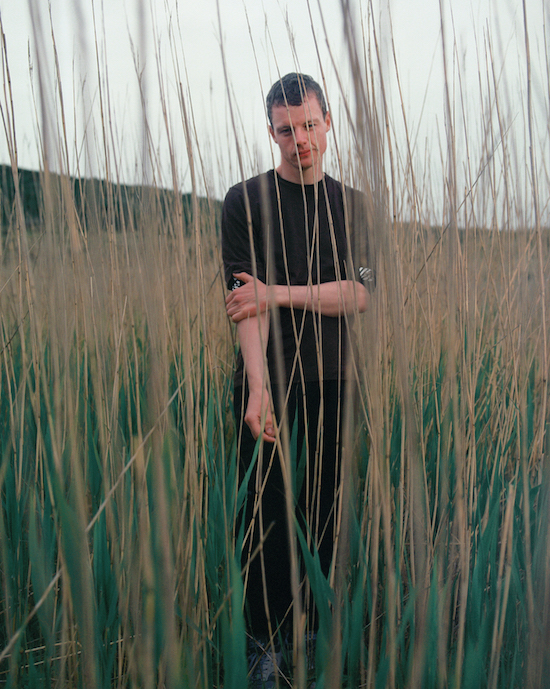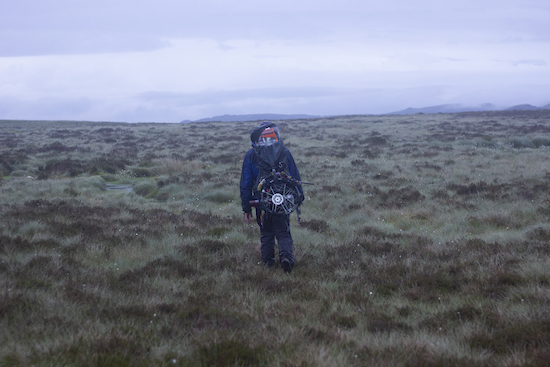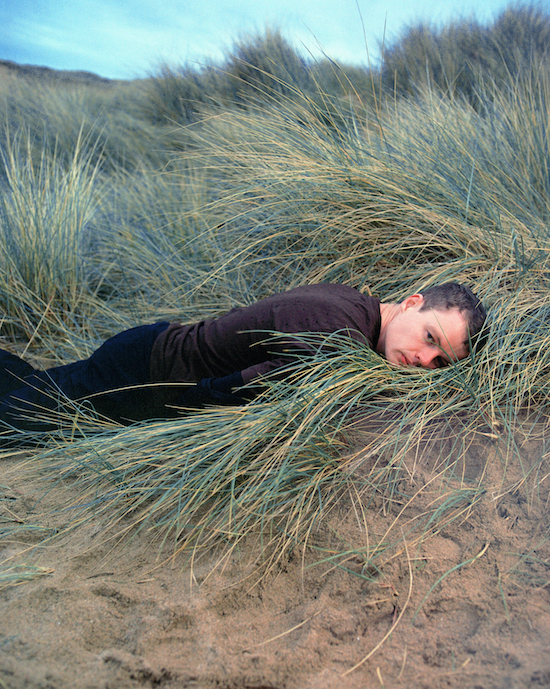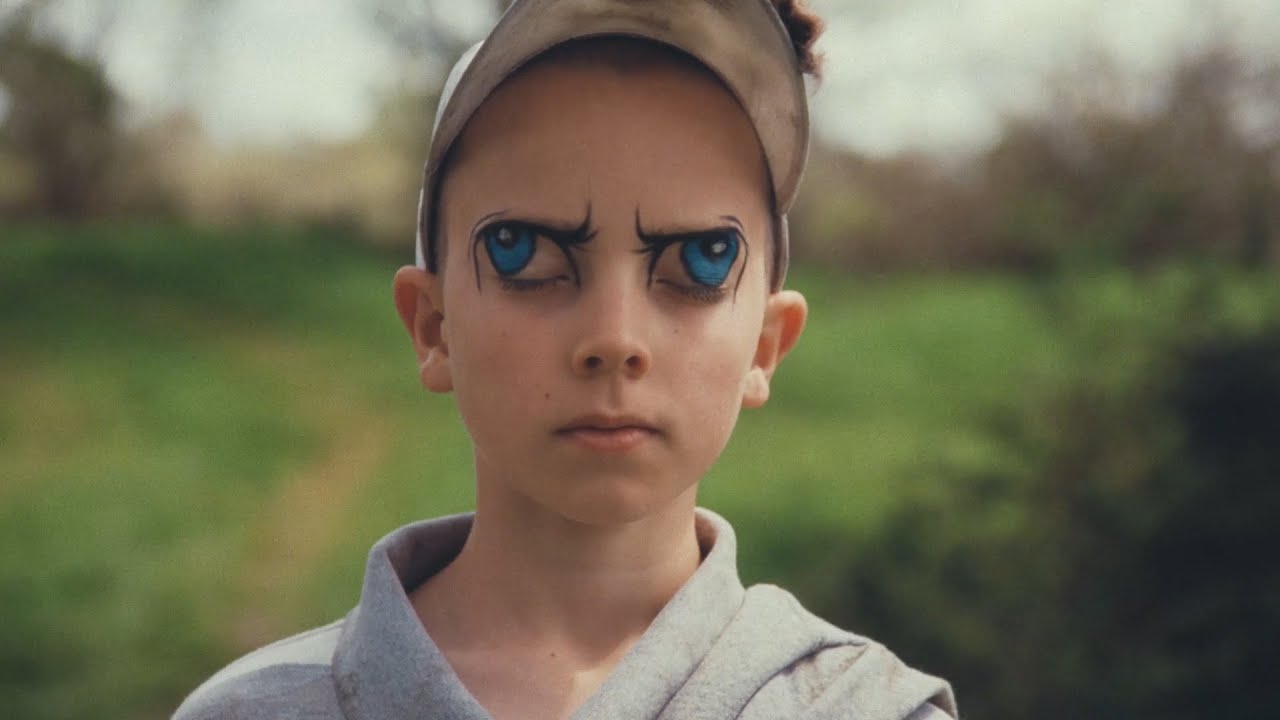Koreless, portrait by Eloise Parry
Lewis Roberts’ childhood was lived in the elements, between wind, water, rock and tree. ”Our house was below sea level, it used to flood every few years when the time or the moon was right,” recalls the artist better known as Koreless, sat in the more benign surroundings of a sunlit North London park in the muggy warmth of July.
His family’s rented home was separated from the world by the menace of water on one side, and a railway on the other, the buildings surrounded by the overgrown remains of Victorian arboreal planting. This sense of dislocation extended to growing up in the outer reaches of Wales itself.
"It was a weird place, Wales is already isolated but doubly so within this walled-off area, a secret garden left to rot," he says, "mum would have an air horn that she’d let off when dinner was ready”. This sense of being culturally adrift suits the title of Lewis’ debut album, Agor, which translates from Welsh as ‘open’. “Agor as a word makes sense as there are a lot of thresholds on the album, it accelerates and turns into something completely different.”
It’s a record of expansive electronics, deep bass rumbles, shimmering melodies, brittle sounds like a mooring rope straining against the weight of a boat as waves around a quay. Deeply atmospheric, to these ears it has its roots in Roberts’ childhood and teenage years.

Koreless, portrait by Eloise Parry
Water surrounds Roberts’ family – one grandad worked in a shipyard (the other was a protestant preacher who fell out with some local spiritualists and ended up doing an exorcism or two), and his brother is a boatbuilder to this day. In his younger years, Roberts became a keen sailor himself, turning up at races in his gardener dad’s Transit, lawnmowers in the back, whereas most of the more well-to-do competitors arrived in fancy camper vans. When he wasn’t on the water, he spent his time hanging out on the mountains of North Wales,"jumping off cliffs, starting fires and stuff", experiencing a fearlessness and appreciation of the Welsh landscape that’s far from the current vogue for sporty mountaineering in high-end puffer gilets.
"I have a friend Dafydd who walks around the mountains barefoot, further than anyone else I’ve ever met, all the way down to South Wales, but just in a Primark jacket,” Roberts says. Though the only records at home were by the likes of Supertramp, music always ran alongside a love of the outdoors, especially "that weird melting pot of music that was going on in 2012, 2011, a big mix of stuff but all very club-focussed at that point".
Deprived of dancefloors, Lewis and friends would go to psytrance raves in remote locations in the Snowdonian mountains ("the landscape was epic but the music was the only problem"), and ended up running their own night in Bangor, hiring a working men’s club, sticking the biggest soundsystem they could in, and inviting DJs down from Glasgow’s Sub Club. "Every crusty within forty miles would come, they’d not really know what was going on but it was great," he says, "I had to stand behind the DJ with a strobe. I wasn’t 18 and I’d get kicked out and have to sneak back in through the fire escape". Craving the rave, Lewis drove to Brighton and back in one night, purely to see Shackleton.
Roberts’ own musical career began "accidentally" after school – with both parents working full time, he’d go round to his grandparents and play piano. He then had piano lessons, but was more interested in the teacher’s spare room packed with old synths, and "I’d just go there and play with the cut-off knobs – that’s when I got into electronic music, aged about ten or eleven. I never learned piano, but I did learnt to make stupid tracks that sounded like Moby," he says, "I was really into him, and anything mildly apocalyptic and vaguely electronic. I had all these Ibiza chill out CDs my uncle gave me – it’s all quite apocalyptic isn’t it? Everything’s going horrible. Teenagers are drawn towards death and the find it in everything, even Cafe Del Mar which is actually probably pretty uplifting."

Koreless, portrait by Daniel Swan
School over, Roberts went to college to study naval technology in Glasgow, once the heart of Scotland’s shipbuilding industry. There, music gradually started to take over. He ended up going clubbing "too much", to places like Sub Club, La Cheetah, and afterparty venues that circumvented the city’s strict licensing laws. Blueprints for frigates were replaced by days and nights spent making music with computer software.
Eventually, he disappeared down the creative wormhole that became Agor, becoming "obsessed with the process" of making music. "It was quite destructive, in a good way,” Roberts says; “I was making something and ripping it up into a hundred pieces, and reassembling it in a different way. Tracks were cannibalistic, and kept eating bits of each other. I enjoyed it though, it was unpleasant in the sense that it took a long time, but it was also really rewarding uncovering stuff all the way through."
This curiosity extends to collaborations, and a mutually supportive relationship with FKA Twigs, who loved his track ‘White Picket Fence’ so much she got in touch: "She texted me this image and idea that I thought was so improbable, saying, ‘This would be a great video’. The idea went on the back burner but eventually she put Lewis in a Lamborghini sports car, parked by pond, surrounded by creatures from a jumble sale armageddon.
He’s full of praise for his collaborator: ”It’s really inspiring to be around her, particularly how uncompromising she is, she helped me get the last bits of the record over the line". Other assistance came from ‘ask the internet a question’ site Quora Digest, when Roberts was stuck as to how to structure an album. He simply made that search, and found wisdom courtesy of a metal musician who stated: "Track one sets the scene, track two is something propulsive, track three’s the ballad, it doesn’t matter about the second third, and it has to end on a bang." Lewis adds: "It just makes so much sense!"
Design, structure – maybe that aborted degree in naval engineering isn’t so far from his music, after all. "I don’t think I’m so good with words but I have more of a engineering brain, or a sculptural brain, I’m always building in that sense,” he says. This relates to how he sees the nightclub (a space he can’t wait to get back into to bring the sounds of Agor to a live audience, now that COVID restrictions are easing. "I have a tendency to think of music quite sculpturally, in terms of space, and in terms of sculptural music it’s always best to hear it played on big speakers. That’s what clubs are for. It’s about building blocks for people to move to.”



